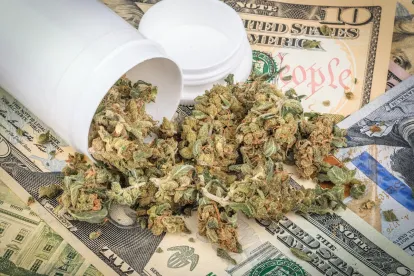1. Cannabis Entering the Metaverse
As we discuss in greater detail here, the Metaverse provides expansive marketing and sales opportunities for cannabis companies due to its decentralized nature and the varied regulatory regimes governing the industry. Because cannabis companies can freely operate, market, and sell their products in certain jurisdictions, different Metaverse platforms have allowed them to bring their operations online. Companies have profited from their Metaverse locations by selling digital tokens and accessories, and in some cases, by selling or advertising cannabis products themselves. However, the Metaverse is not a free-for-all, as existing advertising and marketing regulations will continue to apply, as well as the chosen Metaverse’s terms of service — each of which must be carefully considered before engaging in any business activities. For example, while certain cannabis-focused platforms may exist and be extremely permissive, others, such as Decentraland, may take a more moderate approach by prohibiting direct sales, and others may outright restrict direct and indirect cannabis activity. Nevertheless, as the Metaverse expands and consumers increasingly move their shopping online, cannabis companies should think about expanding their storefronts to meet their customers online.
2. Interstate Marijuana Commerce
Because the federal government has been unsuccessful in passing legislation descheduling marijuana or otherwise addressing the core and ancillary markets’ concerns, states have begun to explore the extent to which they can create an interstate cannabis market. California, Oregon, and Washington have all enacted laws allowing their governors to enter into agreements with other states for the interstate sale of marijuana — but with significant caveats. In Oregon and Washington, interstate cannabis activity will only be allowed if cannabis becomes federally legal. However, California’s law goes a step further by authorizing its governor to forge interstate marijuana agreements if the California Attorney General issues a legal opinion stating that such interstate commerce will not result in significant legal risk to the State of California under the federal Controlled Substances Act (CSA).
On January 27, 2023, the California Department of Cannabis Control (DCC) sent a letter to the California Attorney General’s office, requesting that it issue such an opinion. The letter contends that authorization of the interstate sale of marijuana will not result in significant legal risk to the State of California but does not go so far as to suggest that private individuals engaging in such commerce do so without legal risk. As of the date of this alert, the requested opinion has not yet been issued. However, if only California allows for the interstate trade of marijuana irrespective of federal legalization, it will have no state with which to trade. We anticipate additional states will take similar action to test the extent to which they can create an interstate cannabis market in the absence of express authorization by the federal government.
3. State Statutes That Include In-State Resident Requirements and Preferences Likely Violate the Dormant Commerce Clause
States have struggled with how to license and regulate the cannabis industry. Many regulatory schemes originally contained language that prioritized in-state residents for permits and licenses and sometimes prohibited non-residents from participating altogether. States argued that protectionist legislation was permissible because the CSA implied there was no interstate market for cannabis, thus the dormant Commerce Clause did not apply.
However, most courts that have considered this question disagree, rejecting the argument that there is no interstate market for cannabis, even if it is technically illegal under the CSA. Under US Supreme Court precedent, protectionist legislation requires “unmistakably clear” authority from Congress to restrict the flow of interstate commerce, and the CSA’s criminalization of cannabis does not provide such clear authority to the states. As more states implement legal cannabis regulatory regimes, in-state requirements and preferences are unlikely to withstand scrutiny. However, such rulings may be limited in practical relief. At least two courts have found an in-state resident preference unconstitutional while denying requested relief because of the time, effort, and cost expended by regulators and applicant-licensees in reliance on the wider licensing scheme.
4. Federal Status of Cannabis Restricts Restructuring Options for Insolvent Businesses
Another consequence of cannabis being classified as a Schedule I controlled substance is that distressed cannabis businesses cannot access the federal bankruptcy system to restructure their debts or liquidate their assets. Instead, cannabis operators facing financial distress (and their creditors) must resort to state law alternatives, which differ dramatically across states and in some states do not yet exist. The most common alternative, receivership, is a court-supervised process by which a fiduciary is appointed to manage an insolvent company, typically resulting in the company's liquidation. For creditors, this may be the ideal or only means of mitigating their losses because it is nearly impossible to foreclose on the assets of a cannabis business due to strict limits on transferability of licenses, products, and other assets.
However, as we discuss here, receivership has limitations, such as jurisdictional constraints (i.e., a court order is limited to assets within a particular state), state and local requirements that transfer of assets receive prior approval, and detailed procedural and substantive requirements for transfers, which can vary by city. This year, we anticipate that operators and creditors will continue to explore creative methods of winding down and restructuring, and we hope that state laws and legal precedent will evolve to provide clarity to cannabis operators and receivers alike.
5. Cannabis in Professional Sports
Professional sports leagues in the United States are suspending marijuana testing, removing cannabis from banned substances lists, and adopting policies that can open doors for cannabis-related advertising, sponsorships and business opportunities for players, teams, and leagues.
On April 1, 2023, the National Basketball Association (NBA) and the National Basketball Players Association (NBPA), announced that a tentative Collective Bargaining Agreement was reached, pending ratification by NBA players and team governors. NBA sources have reported that the agreement will make permanent a temporary suspension of marijuana from NBA anti-drug testing protocols first implemented during the COVID-19 pandemic in the 2019 - 2020 season. The agreement will also remove marijuana from the NBA’s list of banned substances. The NBA and NBPA do not intend to release any further details until the agreement is finalized, but Commissioner Adam Silver has stated that the change is part of a greater effort to recognize “society’s views around marijuana” as they are continuing to evolve.
Similarly, the National Football League (NFL) revised its drug testing policies as part of a 2020 collective bargaining agreement to eliminate suspension of players who test positive for any drugs, including marijuana. The agreement increased the threshold for positive testing of tetrahydrocannabinol (THC), reflecting greater acceptance of marijuana use. In 2021, the Ultimate Fighting Championship (UFC) announced that its fighters will no longer be penalized for marijuana use. As detailed in a prior AFS alert, the Major League Baseball (MLB) has removed both marijuana from its list of banned substances and any penalties associated for its use. The MLB also now allows certain cannabidiol (CBD) sponsorships.
Professional athletes in the United States are often regarded as trend setters and cultural icons. In 2023 and beyond, we anticipate continued new opportunities for cannabis businesses to strengthen their partnerships with professional athletes (active and retired), player unions, and leagues.
6. Potential Landlord Risks and Liability
Even if they are not the owners or operators of cannabis businesses, property owners who lease to such businesses must consider the potential legal implications of indirectly participating in the cannabis industry. For example, in New York, Manhattan District Attorney Bragg has announced that his office will force property owners to evict more than 400 illegally-operating cannabis shops if the shop owners do not cease operation. Similarly, under a new law in Washington, DC, “landlords who rent commercial property to unlicensed weed shops” could face fines up to $10,000.
7. Federal Ban on DC Recreational Cannabis Regulation Creates Opportunities for Illegal Cannabis Sales
The Congressional ban on DC recreational cannabis legalization within its borders has contributed to the opening of more than 150 illegal cannabis “gifting” businesses, which sell a customer a nominal article (e.g., a t-shirt) and then “gift” cannabis to the customer as part of the transaction. To address the proliferation of illegal cannabis businesses over the past several years, DC, recently passed the Medical Cannabis Amendment Act (MCAA), which encourages existing illegal businesses to transition to licensed medical cannabis enterprises. The law created new license categories and provides a 90-day application period during which existing illegal businesses have first priority to apply. Certain requirements must be satisfied, such as not being located in a residential district, close to a school, or within 400 feet of an existing retailer. All existing illegal businesses must have had an active business license with the city as of December 31, 2022, and a certificate of occupancy prior to the date on which the application is submitted. Existing illegal businesses have 30 days to shut down operations if their license application is denied, after which they are subject to five-figure fines, property sealing, remediation, and other penalties. Finally, under the new law, the mayor must notify commercial property owners that rent to illegal cannabis businesses of the illegal activities and their liability for those activities, including fines of up to $10,000 and remediation. We will be tracking the implementation of the MCAA and how it impacts the cannabis market in the District of Columbia.
8. Federal Cannabis Status Prevents Federal Trademark Protection
Under the Federal Food, Drug, and Cosmetic Act (FDCA), 21 U.S.C. Chapter 9 and CSA, 21 U.S.C. §§801 et seq., cannabis businesses cannot obtain federal trademark protection or file trademark enforcement actions in federal court for violations of any brand names for cannabis products. Instead, cannabis businesses must rely on state trademark laws, where permissible. Federal registrations for CBD products or services are similarly very difficult to obtain. Businesses seeking federal trademark protection for cannabis have taken creative approaches by seeking protection for any aspects of their businesses that are not federally prohibited such as associated clothing, smoking accessories, or retail store services for other products or attempting to limit the scope of their filings to exclude any prohibited products. The US Patent and Trademark Office (USPTO) closely scrutinizes any applications that may cover cannabis products to avoid approval of these marks.
9. Ongoing Enforcement Against Illegal Operations
As jurisdictions throughout the United States and globally continue to legalize commercial cannabis markets, law enforcement will continue to prioritize enforcement against illicit operations. In some instances, illicit businesses adopt the persona of legitimate dispensaries by occupying prominent retail locations with security, staff, and signage, but lack the necessary permits and regulatory oversight to be fully lawful operations. Other operators function entirely in the black market, growing marijuana plants on land that they do not own (e.g., in public parks and protected areas) utilizing water and electricity that they do not pay for. On the retail side, despite the increased penalties for unlicensed sale of cannabis that generally accompanies legalization, neighborhood “pharmacists” still abound. Targeting these and other illicit operators is important for several reasons, which is why it will continue to be a priority in 2023 and beyond.
First, public safety is critical to the success of cannabis legalization, and unregulated products often contain harmful pesticides, inconsistent concentrations of THC and terpines, and contaminants that are not found in regulated products due to pre-market testing requirements. Second, the significant amount of revenue generated by taxes and licensing fees are a significant motivator for states and cities (and constituents) to legalize commercial cannabis activity, since illicit operators avoid paying taxes and licensing fees. Third, and related, because regulated operators often factor these costs into pricing (in addition to other costs of doing business legitimately, such as rent, salaries, etc.), their products cost more than illegal products. While competition is generally good for a start-up industry, this sort of competition artificially drives prices down, puts financial strain on legal operators and their investors, and often discourages consumers from transitioning from the black market to the regulated marketplace. Lawmakers understand these issues and will therefore continue to increase enforcement efforts as a means of protecting public health, public revenues, and the competitiveness of the regulated cannabis industry.
10. Federal Legalization
Finally, the number one legal challenge that is top of mind for the cannabis industry is whether the US Congress will pass legislation removing marijuana from Schedule 1 of the CSA. Each legislative session, an iteration of a legalization bill gets introduced, but dies before a compromise can be reached that enables it to become law. As more states legalize commercial cannabis activity, some even going so far as to explore whether they can engage in interstate activity absent federal action (see #2 above), pressure continues to mount for Congress to take action. Federal legalization could potentially resolve numerous challenges faced by cannabis operators, including access to traditional banking institutions, creation of model cannabis laws that can replace the patchwork of inconsistent state laws, access to income tax deductions and other federal benefits and programs currently not available because cannabis activity is currently “illegal” under federal law, the ability to trade on the US stock exchange, etc. Federal legalization is by far the most closely watched topic in the cannabis industry and will remain so for the foreseeable future.







 />i
/>i

